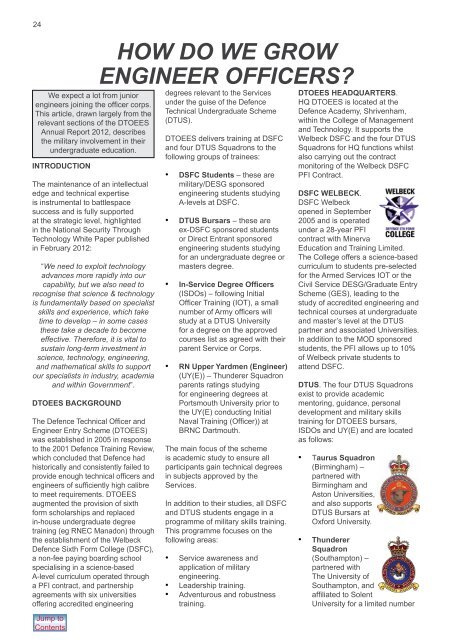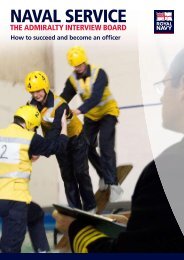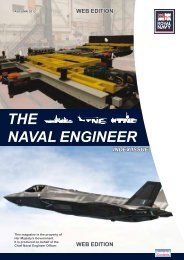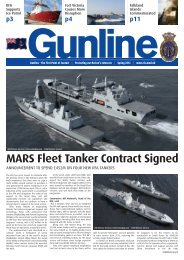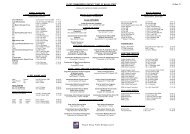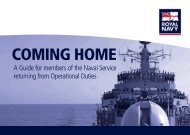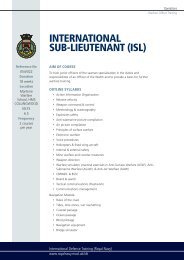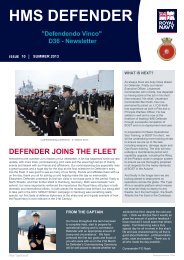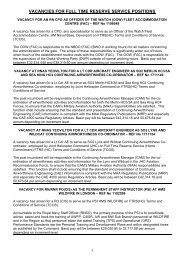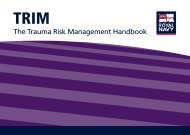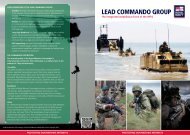THE NAVAL ENGINEER
THE NAVAL ENGINEER
THE NAVAL ENGINEER
You also want an ePaper? Increase the reach of your titles
YUMPU automatically turns print PDFs into web optimized ePapers that Google loves.
24<br />
We expect a lot from junior<br />
engineers joining the officer corps.<br />
This article, drawn largely from the<br />
relevant sections of the DTOEES<br />
Annual Report 2012, describes<br />
the military involvement in their<br />
undergraduate education.<br />
Introduction<br />
The maintenance of an intellectual<br />
edge and technical expertise<br />
is instrumental to battlespace<br />
success and is fully supported<br />
at the strategic level, highlighted<br />
in the National Security Through<br />
Technology White Paper published<br />
in February 2012:<br />
“We need to exploit technology<br />
advances more rapidly into our<br />
capability, but we also need to<br />
recognise that science & technology<br />
is fundamentally based on specialist<br />
skills and experience, which take<br />
time to develop – in some cases<br />
these take a decade to become<br />
effective. Therefore, it is vital to<br />
sustain long-term investment in<br />
science, technology, engineering,<br />
and mathematical skills to support<br />
our specialists in industry, academia<br />
and within Government”.<br />
DTOEES Background<br />
The Defence Technical Officer and<br />
Engineer Entry Scheme (DTOEES)<br />
was established in 2005 in response<br />
to the 2001 Defence Training Review,<br />
which concluded that Defence had<br />
historically and consistently failed to<br />
provide enough technical officers and<br />
engineers of sufficiently high calibre<br />
to meet requirements. DTOEES<br />
augmented the provision of sixth<br />
form scholarships and replaced<br />
in-house undergraduate degree<br />
training (eg RNEC Manadon) through<br />
the establishment of the Welbeck<br />
Defence Sixth Form College (DSFC),<br />
a non-fee paying boarding school<br />
specialising in a science-based<br />
A-level curriculum operated through<br />
a PFI contract, and partnership<br />
agreements with six universities<br />
offering accredited engineering<br />
Jump to<br />
Contents<br />
How Do We Grow<br />
Engineer Officers?<br />
degrees relevant to the Services<br />
under the guise of the Defence<br />
Technical Undergraduate Scheme<br />
(DTUS).<br />
DTOEES delivers training at DSFC<br />
and four DTUS Squadrons to the<br />
following groups of trainees:<br />
• DSFC Students – these are<br />
military/DESG sponsored<br />
engineering students studying<br />
A-levels at DSFC.<br />
• DTUS Bursars – these are<br />
ex-DSFC sponsored students<br />
or Direct Entrant sponsored<br />
engineering students studying<br />
for an undergraduate degree or<br />
masters degree.<br />
• In-Service Degree Officers<br />
(ISDOs) – following Initial<br />
Officer Training (IOT), a small<br />
number of Army officers will<br />
study at a DTUS University<br />
for a degree on the approved<br />
courses list as agreed with their<br />
parent Service or Corps.<br />
• RN Upper Yardmen (Engineer)<br />
(UY(E)) – Thunderer Squadron<br />
parents ratings studying<br />
for engineering degrees at<br />
Portsmouth University prior to<br />
the UY(E) conducting Initial<br />
Naval Training (Officer)) at<br />
BRNC Dartmouth.<br />
The main focus of the scheme<br />
is academic study to ensure all<br />
participants gain technical degrees<br />
in subjects approved by the<br />
Services.<br />
In addition to their studies, all DSFC<br />
and DTUS students engage in a<br />
programme of military skills training.<br />
This programme focuses on the<br />
following areas:<br />
• Service awareness and<br />
application of military<br />
engineering.<br />
• Leadership training.<br />
• Adventurous and robustness<br />
training.<br />
DTOEES Headquarters.<br />
HQ DTOEES is located at the<br />
Defence Academy, Shrivenham,<br />
within the College of Management<br />
and Technology. It supports the<br />
Welbeck DSFC and the four DTUS<br />
Squadrons for HQ functions whilst<br />
also carrying out the contract<br />
monitoring of the Welbeck DSFC<br />
PFI Contract.<br />
DSFC Welbeck.<br />
DSFC Welbeck<br />
opened in September<br />
2005 and is operated<br />
under a 28-year PFI<br />
contract with Minerva<br />
Education and Training Limited.<br />
The College offers a science-based<br />
curriculum to students pre-selected<br />
for the Armed Services IOT or the<br />
Civil Service DESG/Graduate Entry<br />
Scheme (GES), leading to the<br />
study of accredited engineering and<br />
technical courses at undergraduate<br />
and master’s level at the DTUS<br />
partner and associated Universities.<br />
In addition to the MOD sponsored<br />
students, the PFI allows up to 10%<br />
of Welbeck private students to<br />
attend DSFC.<br />
DTUS. The four DTUS Squadrons<br />
exist to provide academic<br />
mentoring, guidance, personal<br />
development and military skills<br />
training for DTOEES bursars,<br />
ISDOs and UY(E) and are located<br />
as follows:<br />
• Taurus Squadron<br />
(Birmingham) –<br />
partnered with<br />
Birmingham and<br />
Aston Universities,<br />
and also supports<br />
DTUS Bursars at<br />
Oxford University.<br />
• Thunderer<br />
Squadron<br />
(Southampton) –<br />
partnered with<br />
The University of<br />
Southampton, and<br />
affiliated to Solent<br />
University for a limited number


